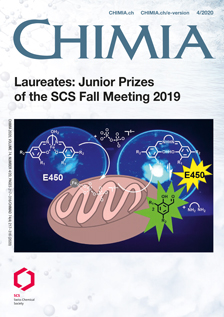The Generated Databases (GDBs) as a Source of 3D-shaped Building Blocks for Use in Medicinal Chemistry and Drug Discovery
DOI:
https://doi.org/10.2533/chimia.2020.241PMID:
32331540Keywords:
Chemical space, Cheminformatics, Drug discovery, Medicinal chemistry, Molecular shapeAbstract
Drug discovery is in constant need of new molecules to develop drugs addressing unmet medical needs. To assess the chemical space available for drug design, our group investigates the generated databases (GDBs) listing all possible organic molecules up to a defined size, the largest of which is GDB-17 featuring 166.4 billion molecules up to 17 non-hydrogen atoms. While known drugs and bioactive compounds are mostly aromatic and planar, the GDBs contain a plethora of non-aromatic 3D-shaped molecules, which are very useful for drug discovery since they generally have more desirable absorption, distribution, metabolism, excretion and toxicity (ADMET) properties. Here we review GDB enumeration methods and the selection and synthesis of GDB molecules as modulators of ion channels. We summarize the constitution of GDB subsets focusing on fragments (FDB17), medicinal chemistry (GDBMedChem) and ChEMBL-like molecules (GDBChEMBL), and the ring system database GDB4c as a rich source of novel 3D-shaped chiral molecules containing quaternary centers, such as the recently reported trinorbornane.Downloads
Published
2020-04-29
How to Cite
[1]
K. Meier, S. Bühlmann, J. Arús-Pous, J.-L. Reymond, Chimia 2020, 74, 241, DOI: 10.2533/chimia.2020.241.
Issue
Section
Scientific Articles
License
Copyright (c) 2020 Kris Meier, Sven Bühlmann, Josep Arús-Pous, Jean-Louis Reymond

This work is licensed under a Creative Commons Attribution-NonCommercial 4.0 International License.







